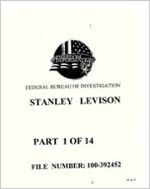Levison, Stanley D., 1912-1979
- Authoritative Name:
- Levison, Stanley D., 1912-1979
- Biography:
- "In 1953 Jack Childs reported to the FBI that an individual named Stanley David Levison (1912-1979), a New York lawyer and businessman, was deeply involved in acquiring and disposing of the funds of the Soviet subsidy to the CPUSA. Levison may have been involved as a financial benefactor to the Party as early as 1945 and may have established legitimate business enterprises in the United States and Latin America in order to launder Soviet funds to the Party. In this connection Levison was said to have worked with Isidore G. Needleman, the representative of the Soviet trading corporation AMTORG. Childs also reported to the FBI that Levison assisted CPUSA leaders to acquire and manage the Party's secret funds and that he directed about $50,000 a year into the Party's treasury. After the death of Party treasurer William Weiner in 1954, Levison's financial role became increasingly important, and Levison, according to Childs, became "the interim chief administrator of the party's most secret funds."2 The FBI maintained close surveillance of Levison, but in mid to late 1955, Levison's financial role began to decline. The FBI decreased its surveillance, although Levison was believed to have occasional contacts with CPUSA leaders. The Bureau eventually terminated surveillance of Levison, probably sometime in 1957. Some indications that CPUSA leaders were disgruntled with Levison led the FBI to interview him on February 9 and March 4, 1960. It is not clear what Levison told the FBI at these interviews, but he definitely rejected the request of the FBI that he become an informant within the Communist Party. In the summer of 1956 Bayard Rustin, himself a former member of the Young Communist League, the youth arm of the CPUSA, introduced Levison to Martin Luther King, Jr. in New York City. Levison and King soon became close friends, and Levison provided important financial, organizational, and public relations services for King and the SCLC. The FBI was not aware of their relationship until very late 1961 or early 1962, and it was the discovery of their relationship that led to the protracted and intensive FBI-DOJ surveillance of King for the remainder of his life. The FBI believed that Levison was still a Communist and that King's relationship with him represented an opportunity for the Communist Party to infiltrate and manipulate King and the civil rights movement." Taken from http://www.martinlutherking.org/helms.html
- Associated Subjects:
- Levison, Stanley D., 1912-1979
- Archival Collections And Reference Resources:
-
1 items in 1 collections (expand all)
Stanley Levison
- Creator:
- United States. Federal Bureau of Investigation
- Date of Original:
- 1950/1975
- Collection:
- FBI Freedom of Information Act Collection
- Contributing Institution:
- United States. Federal Bureau of Investigation
